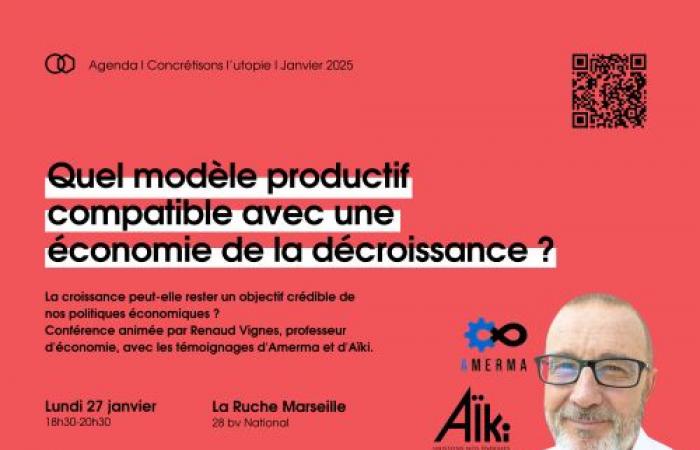Conference led by Renaud Vignes, professor of economics, with testimonies fromAmerma andAiki.
Destruction of the environment and biodiversity, exploitation of populations and resources, ultracapitalist predation and increase in inequalities, etc. But also aging of the population and slowdown in productivity… Can growth remain a credible objective of our economic policies?
The question of local production and therefore of a certain form of reindustrialization poses a major challenge for territorial resilience both in terms of economic activity and jobs, as well as the control of environmental impacts, as well as the social acceptance of these productive activities.
The economist Renaud Vignes speaks of “Permaindustrialisation”. It allows the emergence of cooperative ecosystems and industrial low-tech principles. It would be one of the levers for transforming our economy to move towards a territory that takes into account planetary limits and the social floor. But does it still respond to an economy of degrowth? The cost of production is a challenge for some entrepreneurs: how to lower it? By cooperating and changing scale, of course. And we can only change scale robustly by cooperating.
Renaud Vignes will present the theoretical framework of our discussion then Amerma et AÏKitwo local projects, will present how their activities concretely fit into this direction, highlighting the cooperation of stakeholders and low-tech.
Amerma is a Marseille association for the study, support and implementation of new sustainable industrial and productive approaches with lower environmental impact, with the aim of producing at the local level the goods and services essential to the territory and its ecological transition and social. In this context, Amerma wishes to organize the emergence of technical cooperatives (shared technical platforms, in cooperative governance) for sectors of interest, to contribute to the development of responsible productive practices in the territory: cooperative for the ecological renovation of buildings, mobility and logistics cooperative low carbon, cooperative for sustainable food, etc. We can thus speak of an objective of growth of local ecological productive activities, for a general decrease in the flow of materials and energy as well as predatory and deleterious production and consumption practices. Amerma is a project incubated by Inter-Made.
AÏKi is a player in the building transition. AÏKi offers support (AMO), management (OPC), execution project management (MOEX), of building projects, new or rehabilitation. The construction world is in transition and must reinvent itself. AÏKi explores, broadens the field of possibilities, and attempts to respond to the challenges of tomorrow (help with the development of the regional wood construction sector, use of bio-sourced materials).
Renaud Vignes has a doctorate in economic sciences. Its current commitments aim to popularize the issues of the cooperative ecosystem concept as a basis for the reindustrialization of our territories. He develops the notion of technocapitalism (see the book L’impasse), a form which in particular has a very heavy responsibility in terms of social inequalities and environmental disaster. He is particularly interested in the consequences of deindustrialization (birth of PN. Giraud’s “useless man” and marginalization of a number of territories). To overcome this deindustrialization, we must imagine a new productive model and the work of N. Georgescu-Roegen is particularly instructive in this regard.






